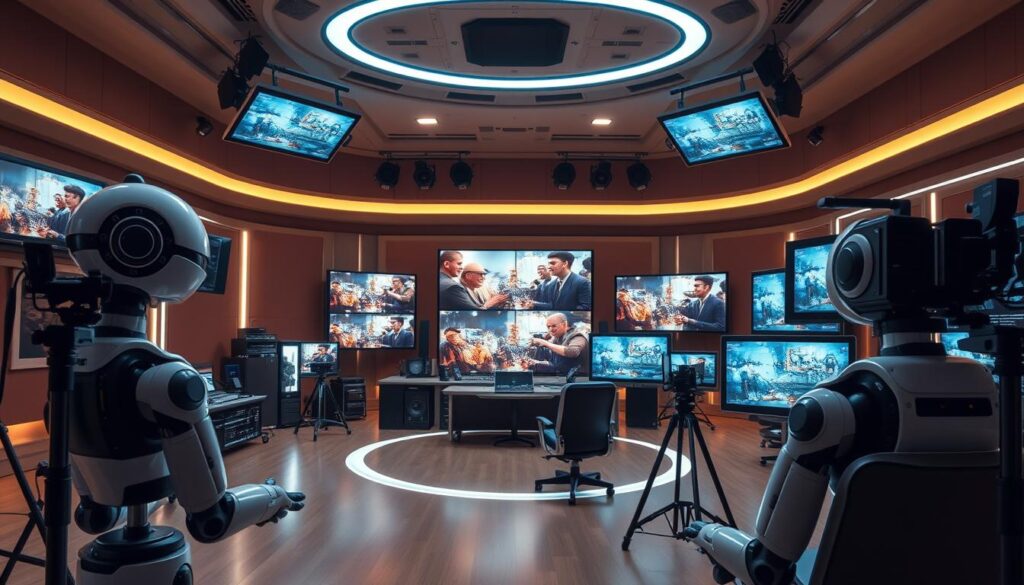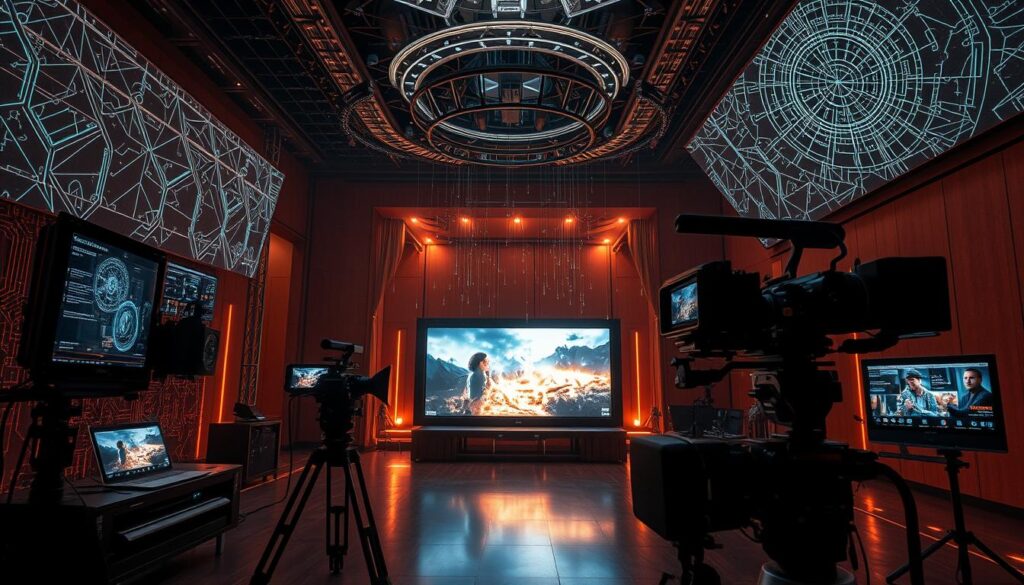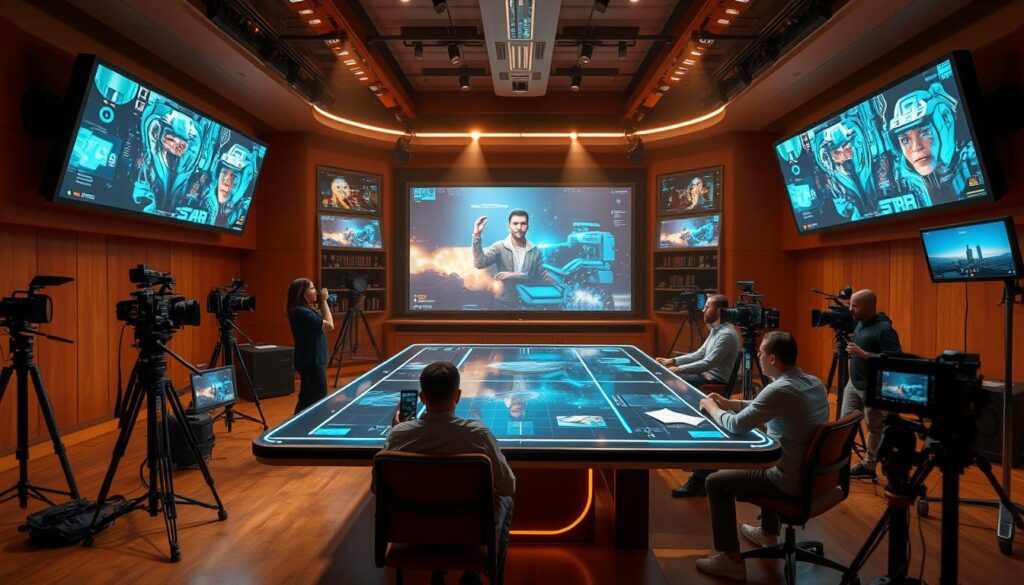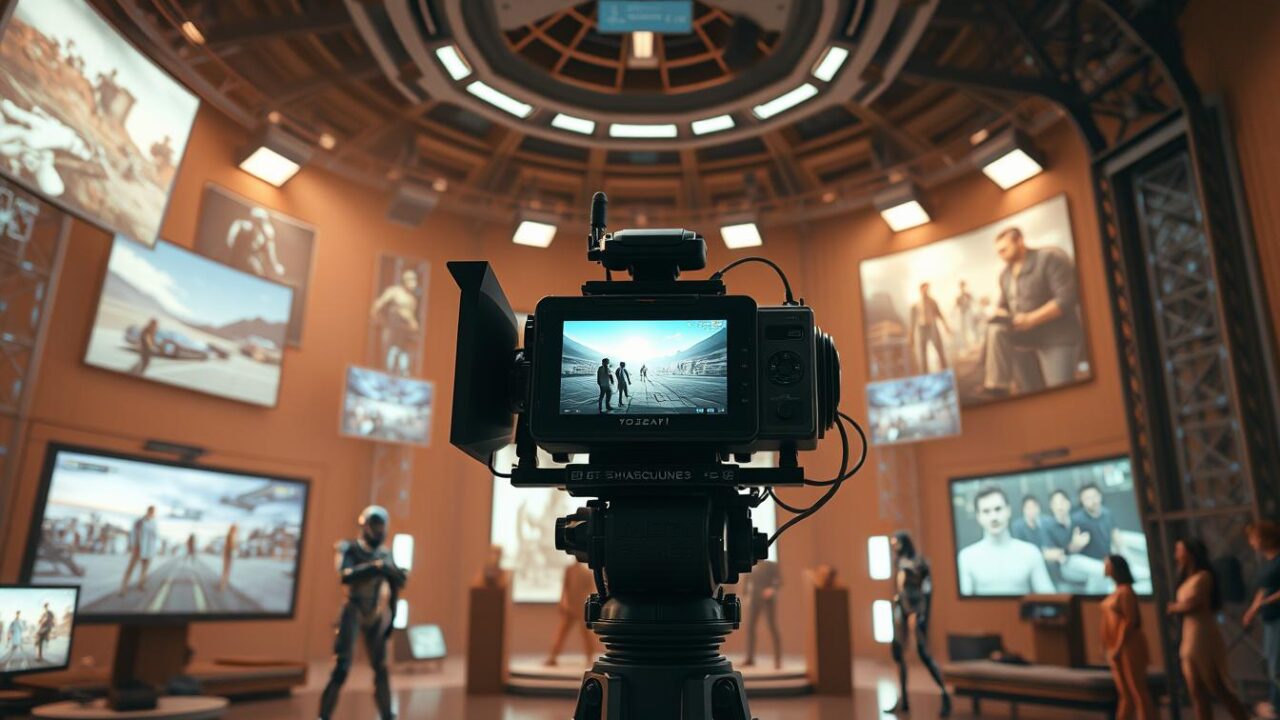Ed Ulbrich, a veteran in visual effects, believes a movie made with AI could hit theaters in 2025. This is as AI investments have soared, with over $55.3 billion in funding by September 2024. Hollywood and AI startups are racing to use AI in movies and TV, marking a big change in filmmaking.
AI has quickly become a big deal in entertainment, with viral deepfake videos showing its power. For example, Metaphysic’s AI Tom Cruise videos on TikTok in 2021 got a lot of attention. This technology is getting better, making high-quality content cheaper and faster to make.
This change in how movies are made could affect jobs in visual effects. AI might make some jobs easier, but it could also make others harder to keep. The Animation Guild’s recent deal shows how AI is changing work in the industry. Finding a way to use AI without losing creative jobs is key.
Key Takeaways
- AI is expected to significantly impact the entertainment industry by 2025, with the potential for a Hollywood-quality movie made entirely with AI.
- Global venture capital investment in AI reached $55.3 billion by September 2024, fueling advancements in AI-driven filmmaking.
- AI-generated content can be produced at a fraction of the cost of traditional methods, with digital modifications executed in milliseconds.
- The rise of AI raises concerns about job security for creative professionals, particularlly in the visual effects industry.
- Balancing the benefits of AI with the need to safeguard creative roles will be crucial as the industry navigates this transformative shift.
The Rise of AI in Filmmaking

The film industry is changing fast with the help of artificial intelligence (AI). AI is now used in many parts of making movies, from writing scripts to editing. It makes making films faster and opens up new ways to tell stories.
In the early stages of making a movie, AI is making a big difference. It can quickly go through scripts and find important parts. This helps filmmakers make their stories better and faster.
AI also helps with making storyboards. This saves time and effort for filmmakers. It’s a big help in getting ready for filming.
AI’s Growing Presence in the Industry
AI is not just for the start of making a movie. It’s also used during filming. AI cameras can follow subjects and keep shots steady. This means filmmakers can get great footage with fewer people.
In editing, AI is changing how movies are put together. It can sort scenes quickly, helping editors work faster. AI can also help with how long scenes should be, making movies more engaging.
Advancements Showcased at CES 2025
CES 2025 showed off the latest in AI for movies. There were demos of neural rendering for movies. This tech makes virtual worlds and characters look real, saving money and giving filmmakers more freedom.
“AI is not replacing human creativity but rather augmenting it. It’s a tool that allows filmmakers to push the boundaries of what’s possible and tell stories in new and innovative ways.” – Sarah Thompson, AI filmmaker
At CES 2025, there was also talk about synthetic media movies. These movies use AI to create characters and scenes that seem real. This raises questions but also offers new ways to tell stories.
AI is here to stay in the film industry. It’s changing how movies are made, from AI movie production to new tech like neural rendering and synthetic media. While there are worries about jobs and creativity, most people are excited. They see AI as a way to make movies better and more interesting.
AI-Driven Content Creation

The film industry is seeing a big change with artificial intelligence (AI). AI is changing how movies are made, from dialogue and music to mixing live action and animation. Deep learning for visual effects and generative AI for movies are leading this change. They help filmmakers tell new stories and bring their ideas to life.
Rachael Appleton is at the center of this change with Wonder Dynamics. This tool lets filmmakers easily mix live action with animation. It cuts down on costs and time, making movies more affordable and efficient.
Robert Zemeckis used Wonder Dynamics in “Here” to de-age actors. This shows how AI can improve movie visuals.
AI-Generated Dialogue and Music
Jason Zada showed how AI can make movies like “The Heist.” This film has AI-created dialogue and music. It shows AI’s power in making engaging stories and soundtracks.
“AI is not just a tool; it’s a collaborator in the filmmaking process. It allows us to push the boundaries of what’s possible and bring our wildest imaginations to life on the big screen.” – Jason Zada, filmmaker
Real-Time Integration of Live Action and Animation
AI is also improving how live action and animation are mixed. Tools like Wonder Dynamics let actors be in animated worlds in real-time. This makes movies more realistic and saves time and money.
AI’s role in movies will only grow. With deep learning for visual effects, generative AI for movies, and computational creativity in film, movies will change. Filmmakers can now make movies that amaze and inspire like never before.
AI as a Tool for Enhancing Creativity

The film industry is using AI to make movies better, not replace human creativity. Brian Brown says AI is like electricity, making other tools work better. This opens up new ways to be creative.
AI is changing how we make movies, from writing scripts to adding special effects. Tools like Scriptbook and Vault AI help writers make better stories. They check if a movie will do well by looking at characters and emotions.
AI also makes visual effects faster and better. It can do tasks like rotoscoping up to 90% faster. AI can even create digital worlds and textures, giving filmmakers more options.
AI helps with sound and editing too. It can make audio clearer and cut editing time in half. This lets editors focus on making the movie better.
Samira Panah Bakhtiar says AI is creating new jobs in film, not taking old ones. It can make marketing more personal and editing better in real-time. This makes movies more engaging and of higher quality.
Some worry AI will take over creativity, but it’s actually helping filmmakers. It lets them tell stories in new ways and work more efficiently. By using AI, the film industry can make movies that captivate audiences all over the world.
Addressing Concerns and Challenges
AI is changing the entertainment world, raising questions about jobs and ethics. Actors and writers are fighting for AI protections in their contracts. They worry that AI could use their work without permission, reducing its value.
It’s important to be clear about AI use in contracts, says Duncan Crabtree-Ireland. Hollywood unions are working together more since the pandemic. Disney’s CEO, Bob Iger, believes in using technology to improve, not just to keep up.
Job Security for Creative Professionals
Many are worried about AI and job displacement in film. AI can now create dialogue, music, and effects, making some jobs seem at risk. But, experts say AI should help, not replace, human creativity.
“AI is not here to replace human creativity, but to augment it. It’s about finding the right balance and leveraging the strengths of both AI and human talent.”
Ethical Considerations and Copyright Issues
AI in entertainment also raises big ethical questions. AI trains on lots of data, including copyrighted stuff, without always asking permission. This makes people wonder about copyright for AI-generated content and the need for rules.
Leaders and lawmakers need to work together to protect creative workers in the AI era. By talking openly and tackling these issues, the entertainment world can use AI wisely and keep its talent safe.
AI and the Future of Acting
Artificial intelligence is changing the entertainment world fast. Digital humans and virtual actors are making movies and TV shows different. They bring new chances and problems for acting’s future.
The Emergence of Digital Humans and Virtual Actors
AI-created characters, or digital actors and virtual performers, are getting better. They can blend into real scenes, opening up new creative paths. For instance, “Here” used AI to show actors as younger versions of themselves over 50 years, something thought impossible before.
“Welcome to Chechnya” showed AI’s power in another way. It used AI to change actors’ faces onto real people, keeping identities safe while telling true stories. This shows AI’s role in telling sensitive stories in new ways.
Balancing the Benefits and Challenges of AI Actors
AI characters bring many benefits, like saving money and doing dangerous stunts safely. But, they also raise big questions for the industry. One big worry is that AI might replace human actors as it gets better at acting.
“What once required 500 artists and years to create a world-class animated movie could potentially be reduced to less than 10% of that effort within three years.” – Jeffrey Katzenberg
There are also doubts about AI actors’ authenticity and range. They might do some roles well, but they can’t match human emotions. David Fincher said AI’s work is like a cheaper version of real movies.
There are also big ethical questions about AI in acting. It’s important to be open about AI use in films, to keep stories true and earn audience trust.
Even with these issues, AI and human actors will likely work together in the future. As AI gets better, finding a way to use both will be key to making movies and TV shows that touch our hearts.
A Hollywood-Quality Movie (Made with AI): Is It Possible?
The film industry is on the verge of a big change. Machine learning in film production and ai-driven movie making are becoming more common. New AI tools could make movies faster and cheaper. But, making ai-powered blockbusters is still a big challenge.
Runway’s CTO thinks we could make Hollywood-quality movies with AI in just 2 years. This is thanks to AI video models like Sora, which can now make videos up to a minute long. But, many doubt if AI can match the emotional depth and star power of traditional movies.
AI could make making movies cheaper and faster. For example, a tool at TIFFCOM could cut a $4.1 million budget to $400,000. Yet, the mixed reviews of “Here” show that AI movies can be hit or miss with audiences.
“AI video generation tools represent a complete shift from previous methods, aiming to replace much, or all, of traditional principal photography.” – Industry Expert
Independent producers and creators are quick to use AI tools. But, big studios are slower to adopt AI for making movies. They worry about talent and legal issues with AI.
The industry needs to find a way to use AI wisely. Strikes by labor unions show the need for open talks. While making a movie with AI by 2025 is uncertain, AI’s impact on storytelling is huge.
The Potential for Democratizing Creativity
AI in filmmaking is changing how we think about creativity. At CES, experts talked about how AI can help new filmmakers. It could make making movies easier and more affordable for everyone.
Director Jason Zada’s new film shows how AI can change movies. It can make movies faster and cheaper. This could make filmmaking more efficient and open to more people.
Shifting Focus to Storytelling Fundamentals
AI is exciting, but we must teach storytelling basics. AI content often lacks depth, showing the need for human touch. Filmmakers need to learn about AI and storytelling.
Accessibility and Opportunities for Aspiring Filmmakers
AI is empowering indie filmmakers by making things easier. With AI, producers can pick projects that might do well. This could help indie filmmakers compete with big studios.
AI is changing movies, but we need to think about ethics and laws. AI makes it hard to know what’s real and what’s not. We also need rules for AI-made art.
Balancing Efficiency and Human Touch in Film Production
AI is changing Hollywood, making things more efficient and profitable. Tools like ScriptBook can guess how well a movie will do with 84% accuracy. This lets writers spend more time on creative work, not just typing.
But, using AI in movies also brings challenges. It’s hard to keep the human touch when tech does so much. AI helps plan shoots and predict what audiences will like, but it might not always choose the best story.
AI is also making some worry about their jobs. In areas like visual effects, AI could replace some roles. The industry needs to find a way to keep creative jobs safe while using AI.
Despite these worries, many people think AI and humans can work well together. They believe AI can help artists focus on their work, making movies better. AI is even helping with things like lighting and camera settings, making shoots easier and more creative.
The film world is changing fast with AI. It’s important to use technology wisely and keep the human side of movies alive. By working together, Hollywood can make movies faster and better, keeping creativity at the center.
The Economic Impact of AI on Hollywood
The film industry is on the verge of a big change with AI. It could add $2.6 trillion to $4.4 trillion to the global economy each year. In the media and entertainment sector, AI could boost revenues by $80 billion to $130 billion annually.
AI is changing how movies are made and watched. Filmmakers are using it for special effects and changing actors’ looks. 42% of Americans support AI for special effects or changing actors’ looks in films and TV.
AI is making filmmaking cheaper and faster. It could cut a $4.1 million budget to $400,000, saving about 90%. Investors are taking notice, with some putting $50,000 to $150,000 into AI projects.
Optimism Among Executives and Investors
Despite challenges, there’s growing optimism in the entertainment industry. AI is seen as a chance for new investments because it lowers costs and speeds up production. Nicholas Khoo notes that venture capital in AI entertainment is increasing.
Adapting Workforce and Safeguarding Creative Roles
AI is changing the film industry, raising concerns about jobs. But AI is meant to help, not replace, human creativity. It’s important for filmmakers and studios to adapt and protect creative roles.
“AI is not here to replace human creativity; it’s here to augment it. By leveraging AI technologies, filmmakers can push the boundaries of their imagination and create more engaging, immersive experiences for audiences.” – Sarah Thompson, AI Researcher
The film industry must find a balance between AI and human touch. By doing so, it can use AI to make the industry more vibrant and successful.
Conclusion
The film industry is slowly getting back on its feet after the pandemic. AI in filmmaking is bringing both new chances and hurdles. AI chatbots like ChatGPT can come up with over 100 film ideas and 50 scripts in just an hour. This shows how AI can make things more efficient and cheaper.
AI can cut down post-production time by up to 70%. It also makes scene generation 60% better. This could mean filmmakers can make up to five times more content each year. This big change could alter how films are made.
But, the use of AI also brings up big questions about ethics in entertainment. There are worries about copyright and the realness of creative work. Even so, 72% of filmmakers think AI will change how we create by 2025, making it better, not worse.
The secret to success is using AI wisely and working together with humans. This way, the film industry can enter a new era by 2025 and beyond. AI could make production costs drop by 30-50%, helping more people make movies, even when money is tight.
By 2025, AI-generated content is expected to be worth over $2 billion in the film world. It’s clear that the future of movies will be a mix of human creativity and AI.
Want to hire me as a Consultant? Head to Channel as a Service and book a meeting.

